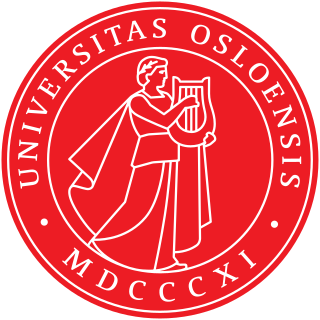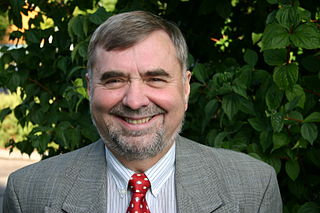The following outline is provided as an overview of and topical guide to education:

Psychometrics is a field of study within psychology concerned with the theory and technique of measurement. Psychometrics generally refers to specialized fields within psychology and education devoted to testing, measurement, assessment, and related activities. Psychometrics is concerned with the objective measurement of latent constructs that cannot be directly observed. Examples of latent constructs include intelligence, introversion, mental disorders, and educational achievement. The levels of individuals on nonobservable latent variables are inferred through mathematical modeling based on what is observed from individuals' responses to items on tests and scales.

The University of Oslo is a public research university located in Oslo, Norway. It is the highest ranked and oldest university in Norway. It is consistently ranked among the top universities in the world and as one of the leading universities of Northern Europe; the 2022 Academic Ranking of World Universities ranked it the 67th best university in the world and the third best in the Nordic countries. In 2023, both the QS World University Rankings and the Times Higher Education World University Rankings listed the university as the highest ranked Norwegian university, placing it 101st and 126th in the world respectively.
Survey methodology is "the study of survey methods". As a field of applied statistics concentrating on human-research surveys, survey methodology studies the sampling of individual units from a population and associated techniques of survey data collection, such as questionnaire construction and methods for improving the number and accuracy of responses to surveys. Survey methodology targets instruments or procedures that ask one or more questions that may or may not be answered.
Program evaluation is a systematic method for collecting, analyzing, and using information to answer questions about projects, policies and programs, particularly about their effectiveness and efficiency.
Construct validity concerns how well a set of indicators represent or reflect a concept that is not directly measurable. Construct validation is the accumulation of evidence to support the interpretation of what a measure reflects. Modern validity theory defines construct validity as the overarching concern of validity research, subsuming all other types of validity evidence such as content validity and criterion validity.
Learning styles refer to a range of theories that aim to account for differences in individuals' learning. Although there is ample evidence that individuals express personal preferences for how they prefer to receive information, few studies have found any validity in using learning styles in education. Many theories share the proposition that humans can be classified according to their "style" of learning, but differ in how the proposed styles should be defined, categorized and assessed. A common concept is that individuals differ in how they learn.

The Programme for International Student Assessment (PISA) is a worldwide study by the Organisation for Economic Co-operation and Development (OECD) in member and non-member nations intended to evaluate educational systems by measuring 15-year-old school pupils' scholastic performance on mathematics, science, and reading. It was first performed in 2000 and then repeated every three years. Its aim is to provide comparable data with a view to enabling countries to improve their education policies and outcomes. It measures problem solving and cognition.

The Global Atmosphere Watch (GAW) is a worldwide system established by the World Meteorological Organization – a United Nations agency – to monitor trends in the Earth's atmosphere. It arose out of concerns for the state of the atmosphere in the 1960s.
Cultural competence, also known as intercultural competence, is a range of cognitive, affective, and behavioural, linguistic, skills that lead to effective and appropriate communication with people of other cultures. Intercultural or cross-cultural education are terms used for the training to achieve cultural competence.
A patient-reported outcome (PRO) is a health outcome directly reported by the patient who experienced it. It stands in contrast to an outcome reported by someone else, such as a physician-reported outcome, a nurse-reported outcome, and so on. PRO methods, such as questionnaires, are used in clinical trials or other clinical settings, to help better understand a treatment's efficacy or effectiveness. The use of digitized PROs, or electronic patient-reported outcomes (ePROs), is on the rise in today's health research setting.

Shlomo S. Sawilowsky was professor of educational statistics and Distinguished Faculty Fellow at Wayne State University in Detroit, Michigan, where he has received teaching, mentoring, and research awards.
The Ministry of Education and Research is a Norwegian government ministry responsible for education, research, kindergartens and integration. The ministry was established in 1814 as the Royal Ministry of Church and Education Affairs.

The Centre for Development Studies (CDS), Thiruvananthapuram, Kerala, India is a premier Social Science research institute. It is also a higher education institution providing M.A. course in applied economics and PhD course in economics. The institute is internationally reputed for being a centre for advanced learning in economics. Its main objective is to promote research, teaching and training in disciplines relevant to development.
Nambury S. Raju was an American psychology professor known for his work in psychometrics, meta-analysis, and utility theory. He was a Fellow of the Society of Industrial Organizational Psychology.

Inge Harald Monrad Aas is a Norwegian researcher.
The PRECEDE–PROCEED model is a cost–benefit evaluation framework proposed in 1974 by Lawrence W. Green that can help health program planners, policy makers and other evaluators, analyze situations and design health programs efficiently. It provides a comprehensive structure for assessing health and quality of life needs, and for designing, implementing and evaluating health promotion and other public health programs to meet those needs. One purpose and guiding principle of the PRECEDE–PROCEED model is to direct initial attention to outcomes, rather than inputs. It guides planners through a process that starts with desired outcomes and then works backwards in the causal chain to identify a mix of strategies for achieving those objectives. A fundamental assumption of the model is the active participation of its intended audience — that is, that the participants ("consumers") will take an active part in defining their own problems, establishing their goals and developing their solutions.
Oslo and Akershus University College was the largest state university college in Norway from its establishment in 2011 until 2018, when it was transformed into Oslo Metropolitan University, the youngest of Norway's new universities.
CRIStin is the national research information system of Norway, and is owned by the Royal Ministry of Education and Research. CRIStin documents all scholarly publications by Norwegian researchers, and complements the BIBSYS database, which focuses on storage and retrieval of data pertaining to research, teaching and learning – historically metadata related to library resources. CRIStin is the first database of its kind worldwide.
Randy Elliot Bennett is an American educational researcher who specializes in educational assessment. He is currently the Norman O. Frederiksen Chair in Assessment Innovation at Educational Testing Service in Princeton, NJ. His research and writing focus on bringing together advances in cognitive science, technology, and measurement to improve teaching and learning. He received the ETS Senior Scientist Award in 1996, the ETS Career Achievement Award in 2005, the Teachers College, Columbia University Distinguished Alumni Award in 2016, Fellow status in the American Educational Research Association (AERA) in 2017, the National Council on Measurement in Education's (NCME) Bradley Hanson Award for Contributions to Educational Measurement in 2019, the E. F. Lindquist Award from AERA and ACT in 2020, and elected membership in the National Academy of Education in 2022. Randy Bennett was elected President of both the International Association for Educational Assessment (IAEA), a worldwide organization primarily constituted of governmental and NGO measurement organizations, and the National Council on Measurement in Education (NCME), whose members are employed in universities, testing organizations, state and federal education departments, and school districts.






